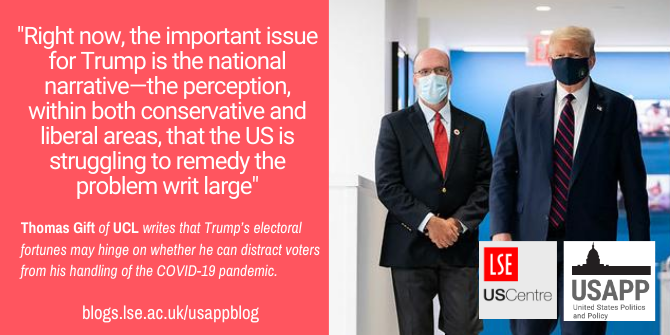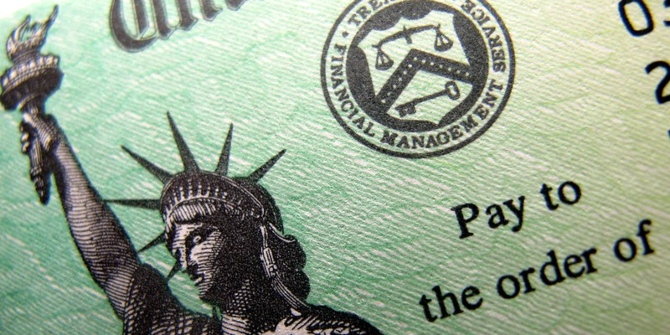 With less than three months to go before the 2020 US elections, President Trump is fighting the dual challenges of the coronavirus pandemic and a plummeting economy writes Thomas Gift in this Q&A. Trump’s strategy now will likely be to distract voters from his poor handling of the COVID-19 pandemic by attacking Joe Biden as being too far to the left.
With less than three months to go before the 2020 US elections, President Trump is fighting the dual challenges of the coronavirus pandemic and a plummeting economy writes Thomas Gift in this Q&A. Trump’s strategy now will likely be to distract voters from his poor handling of the COVID-19 pandemic by attacking Joe Biden as being too far to the left.
We’re now less than three months out from the 3 November US elections, and the coronavirus is still dominating headlines. What do the polls say about Trump’s record on COVID-19?
The poll numbers are unmistakable: Americans are dissatisfied with Trump’s handling of the coronavirus. Nationally, according to 538, only about 38 percent of citizens approve of how he’s managed the pandemic. That’s declined from almost 50 percent back in March—and the trend downward has been steady and consistent. Of course, those numbers do vary significantly by party membership. Roughly 78 percent of Republicans currently approve of Trump’s management of COVID-19, whereas only about 9 percent of Democrats feel that way. But the bottom line is clear: Trump has been damaged politically by the coronavirus, as he battles the twin challenges of a staggering health crisis and an economy that’s been mostly in free fall over the last several months.
Are there any political wins that Trump can point to in his management of the coronavirus?
Trump is intent on claiming victories against the coronavirus, whether real or imagined. His insistence that the US is succeeding at dampening infection rates, however, is incompatible with the sobering data coming out of the Centers for Disease Control (CDC). The US has suffered more than 150,000 deaths from the coronavirus. It recently surpassed 75,000 new infections in a day. Successes have been few and far between. Trump often touts as a win that he shut down travel from China back in January. He did make the decision despite some opposition, and White House coronavirus advisor Anthony Fauci later applauded the move. It’s hard to measure the exact impact of the policy, but Trump returns to it again and again in countering the notion that his response was flat-footed.
How has the coronavirus affected different parts of the US, and what are its implications for the upcoming election?
We’ve seen a discernible pattern in the geographic spread of the virus in the US. Initially, cases were concentrated in major metropolitan areas, particularly New York City. By July, high infection rates had spread rapidly to other parts of the country, including the South and West—especially California, Texas, and Florida. A number of other states, as we speak, are now trying to short-circuit an increase in cases. Because the coronavirus has now been prevalent across much of the US, its geographic-specific effects on politics could be minimal, or at least less pronounced than they might otherwise have been. Right now, the important issue for Trump is the national narrative—the perception, within both conservative and liberal areas, that the US is struggling to remedy the problem writ large.
Some experts think that Trump might be able to say a vaccine is on its way before Election Day. How would that change the dynamics of the 2020 race?
If a vaccine looks even somewhat imminent by Election Day—and that’s a big “if”— it would clearly be a boon for Trump’s re-election bid. Americans are looking for hope, and the promise of a vaccine would enable Trump to reassure the country that help is on the way. Rather than spending the next three months defending his management of the pandemic, his pitch could be: “We’re over the hurdle. Now let’s turn our attention to 2021. A strong economy. 3.5 percent unemployment. Let’s get back there.” That messaging could reorient the public consciousness and swing the polls. Moreover, there’s no doubt that news of a pending vaccine would also give a jolt to Wall Street and the broader economy, which would move the needle in favor of Trump winning four more years in office.
Democratic nominee and former Vice President Joe Biden has obviously criticized Trump’s handing of the coronavirus. Specifically, what does he say he’d do differently to curb the pandemic if elected?
Apart from more competently managing the day-to-day policymaking linked to COVID-19, Biden has promised to show stronger leadership in at least two main areas. The first is to emphasize more of a “follow the science” approach—and all of the policy implications that flow from that. The critique from Democrats is that Trump has not only failed to do this, but has actually taken to denigrating well-respected specialists in the field like infectious disease experts Drs. Anthony Fauci and Deborah Birx. Additionally, Biden has pledged to promote clear rules (and enforcement) over what Americans need to do to foster a culture of public health compliance—including a mandate for mask-wearing. This is an area where Trump has, at best, sent mixed signals by often previously refusing to wear a mask himself.
What will Trump and Biden’s main campaign strategies be from now on, particularly in light of what’s occurring with the coronavirus?
Trump’s strategy will almost certainly be to change the topic and to distract from the coronavirus. He wants to make this election a referendum about anything but the pandemic because, right now, Trump’s odds of getting re-elected fall every time COVID-19 makes front page news. Trump will also pair that diversion with attacking Biden as beholden to the more far-left elements of his party, especially if his vice presidential pick is seen as more progressive. Meanwhile, Biden may think that his smartest strategy is to play not to lose rather than to win. So long as Trump’s poll numbers continue to self-destruct, Biden’s best approach might be passivity—stay on the sidelines, watch events play out, and hope he can coast to the Oval Office based on Trump’s unpopularity.

“President Trump at the American Red Cross National Headquarters” by The White House is Public Domain.
What will have the biggest effect on the 2020 US election: the coronavirus or the state of the economy?
The economy and the virus are inextricably connected. Last quarter, the US economy contracted by 32.9 percent. That’s the worst we’ve seen since World War II. Unemployment also remains in double digits, around 11 percent. Trump does point to a resilient stock market, but that’s small consolation for rank-and-file voters who can’t make rent or pay for basic necessities. Because the economy will continue to struggle as long as coronavirus cases remain high, flattening the curve needs to be the first-order priority. That’s not to say the US economy will then quickly bounce back. But getting infections under control will put it on a path to gradual improvement. In the meantime, that shouldn’t preclude Washington from crafting another much-needed stimulus package.
Trump can’t seem to resist getting into skirmishes with health experts, including at the CDC. How should we interpret these controversies?
Trump has had an icy relationship with the CDC, and he’s been outspoken in criticizing the institution for quite some time. A case in point was just recently, when Trump critiqued CDC guidelines over reopening schools for what he said were policies that would be too restrictive and costly. This is emblematic of Trump’s general skepticism toward elite institutions, technocrats, experts, authority figures, and so on. It’s an argument that plays well with Trump’s conservative base. Back in April, for example, Johns Hopkins University conducted a national survey regarding the coronavirus and found that 46 percent of Americans don’t trust science “a lot.” So Trump has been willing to challenge public health experts to a large degree because it resonates with a not insignificant bloc of voters.
Trump has said that the United States will withdraw from the World Health Organization. Will this be a significant issue for Americans at the polls?
Amid everything else that’s happening, the WHO probably won’t be at the top of voters’ minds in November. But Trump’s approach to the WHO is consistent with his broader “America First” foreign policy. Trump has regularly advocated a go-it-alone, belligerent unilateralism that’s reflected in much of what he’s done on the world stage, including everything from severing ties with the Paris Climate Agreement, to exiting the Trans-Pacific Partnership, to getting into scuffles at the G-7 and NATO summits. It’s another example of Trump activating his dyed-in-the-wool supporters, who generally favor his challenges to supranational institutions. The approach alienates many Democrats and moderate voters, but Trump seems willing to accept those concessions to satisfy his most loyal base.
- These remarks are based in part on a forthcoming video series interview in The Telegraph by Thomas Gift.
Please read our comments policy before commenting.
Note: This article gives the views of the author, and not the position of USAPP – American Politics and Policy, nor the London School of Economics.
Shortened URL for this post: https://bit.ly/2PvXEcz
About the author
 Thomas Gift – UCL
Thomas Gift – UCL
Thomas Gift is a Lecturer of Political Science at UCL, where he teaches on Public Policy Economics and Analysis and is the Director of the Philosophy, Politics, and Economics (PPE) Programme. He is also a Visiting Fellow at the LSE US Centre.






